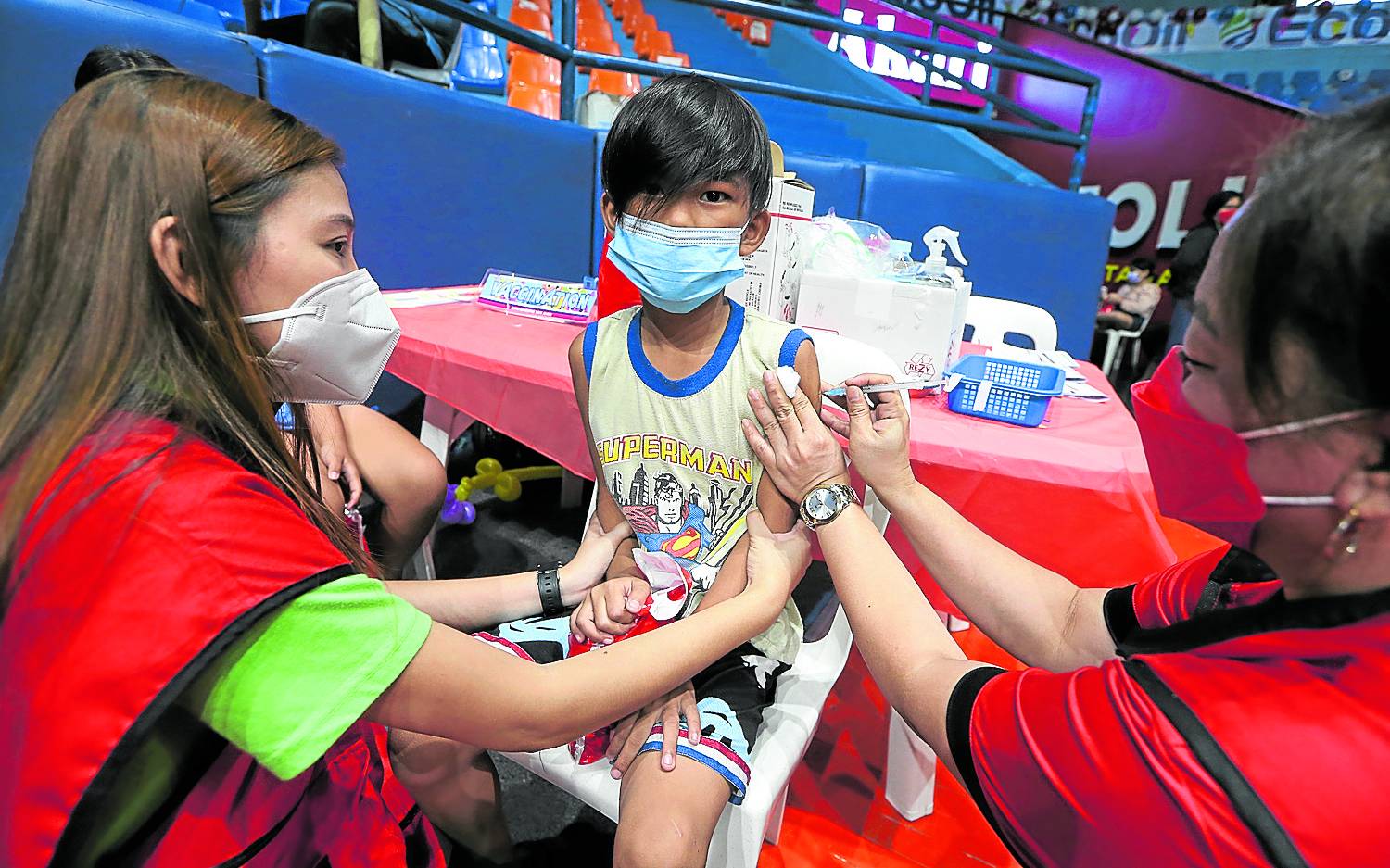DOH: Still no boosters OKd for kids age 5-11

A child has to be calmed down and held in place as he receives his first dose of the Pfizer COVID-19 vaccine at Filoil Flying V Center in San Juan City. —NIÑO JESUS ORBETA/INQUIRER FILE PHOTO
Despite the resumption of in-person classes, young children are still ineligible to receive COVID-19 booster shots as drug manufacturers have yet to apply for an emergency use authorization (EUA) of vaccines for kids 5 to 11 years old, according to the Department of Health (DOH).
Last May, the vaccine expert panel said it was waiting for COVID-19 vaccine manufacturers to apply with the Food and Drug Administration (FDA) for the EUA of boosters for this age group, but the FDA has yet to receive applications as of Thursday, the DOH said.
In August, the DOH noted though that “there is still no scientific evidence to support the need for booster doses for that age group” in the country.
Booster shots, however, have been available to minors age 12 to 17 since July.
In the United States, its FDA on Wednesday approved the updated coronavirus booster shots for children age 5 to 11 years.
Article continues after this advertisementThe US Centers for Disease Control and Prevention (CDC) also recommended the shots for kids, specifically the “bivalent” or reformulated boosters that target the Omicron BA.5 subvariant.
Article continues after this advertisementIn a press briefing earlier this week, Health Undersecretary Maria Rosario Vergeire, officer in charge of the DOH, admitted the challenges in vaccinating children despite the resumption of in-person classes.
Vergeire appealed to parents to allow their school-age children to receive vaccines against COVID-19.
“We are [asking] parents, especially now that we are holding face-to-face classes, to see that the COVID-19 vaccines we are offering are proven safe and effective against the infection,” the health official said.
Children 5 to 11 years of age have the lowest full vaccination rate across all age groups at only 46 percent.
“The first challenge in vaccinating children would be the hesitancy of their parents,” said Vergeire.
The DOH said it was working to continuously educate and reassure parents, as well as ensure “that the influencers of the parents could be health workers in the community or school staff who can adequately inform them” about vaccine protection.
Barangay assemblies
The national vaccination program has barely moved more than three months since the new administration came in, prompting Interior Secretary Benhur Abalos to urge all the 42,046 barangays nationwide to encourage their constituents to get vaccinated and boosted during the conduct of the barangay assembly day this month.
“We call on the punong barangays and other officials to fulfill their mandate and conduct barangay assembly days. I hope the barangays use this opportunity to talk to their constituents and encourage them to be vaccinated and boosted against COVID-19,” Abalos said in a statement on Thursday.
Under the Local Government Code and Proclamation No. 599, series of 2018, barangays are required to conduct a barangay assembly twice a year on any of the Saturdays or Sundays of March and October to hear and discuss the semestral report of the Sangguniang Barangay concerning its activities, finances and issues.
Abalos said village chiefs must take advantage of the barangay assembly to discuss the advantages of getting boosted and vaccinated against COVID-19 and invite the citizens to join vaccination campaigns such as “PinasLakas.”
They must also inform the public that COVID-19 booster shots are now accessible in their workplace, transportation terminals and drugstores, among others.
Launched in late July, the government’s vaccination campaign PinasLakas aims to give booster shots to 23.8 million individuals within the first 100 days of the administration of President Marcos.
But data from the DOH’s National COVID-19 Vaccination Dashboard showed that the number of administered vaccines barely increased since July.
Total doses administered increased by only 6 percent from 154,237,449 on July 2, to 164,294,114 on Oct. 11.
This means that only 10,000 doses (whether for the primary series or for boosters) were administered each day for the past 100 days—far from last year’s output of more than 600,000 daily inoculations.
READ: PH in talks with 4 manufacturers for possible vax booster shots — Galvez
For more news about the novel coronavirus click here.
What you need to know about Coronavirus.
For more information on COVID-19, call the DOH Hotline: (02) 86517800 local 1149/1150.
The Inquirer Foundation supports our healthcare frontliners and is still accepting cash donations to be deposited at Banco de Oro (BDO) current account #007960018860 or donate through PayMaya using this link.